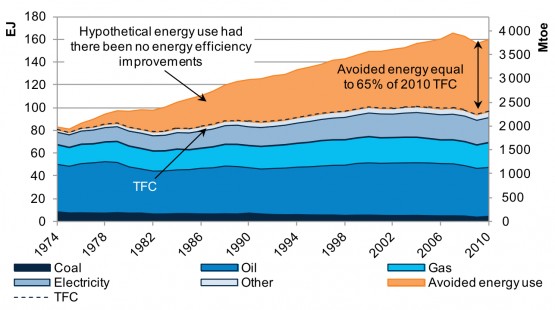By Samantha Bresler | Wed, March 19, 14
Energy Efficiency has an impediment when it comes to being recognized as a climate solution – it lacks oomph appeal. It doesn't have Solar energy’s dazzling solar arrays glinting in the brilliant radiance of the sun. Nor does it have Wind energy’s elegantly arching wind mills, so sophisticated and alluring so as to capture the mind of Don Quixote. It doesn't even have Hydropower’s ferocious tumble and roar of water. Nope, it has none of that. What does it have? It has regulations, excel spreadsheets and technological advances. Energy efficiency is full of abstraction – at best it has cold data.
 "Energy efficiency needs to go from a 'hidden fuel' to a 'first fuel' as it exceeds the output from ANY OTHER fuel source."
"Energy efficiency needs to go from a 'hidden fuel' to a 'first fuel' as it exceeds the output from ANY OTHER fuel source."But guess what? Climate change is knocking at our door. Deniers troll the internet, Congress has been reduced to a sideshow of an all-nighter, and the international treaties are a stalled frustration. Meanwhile, in the face of all that nonsense, energy efficiency is getting the job done. The United Nation’s Environmental Program launched a new initiative, ‘Sustainable Energy for All’ (SE4ALL), and will be relying heavily on Energy Efficiency as one of their main pillars for success. Voluntary efficiency programs, such as ENERGY STAR under the Environmental Protection Agency, have saved 1.9 billion metric tons of greenhouse gas over the past two decades. So, those excel spreadsheets end up looking pretty impressive.
Climate change is high stakes and given energy efficiency’s elusiveness, it is oftentimes overlooked. This is overwhelmingly frustrating given energy efficiency’s proof as a powerful demand-side resource. A recent IEA report succinctly stated that energy efficiency needs to go from a “hidden fuel” to a “first fuel” as it exceeds the output from ANY OTHER fuel source. Look at the same information in another way, and energy efficiency is responsible for keeping ‘Total Final Consumption’ of generated power relatively flat. In other words, energy efficiency is responsible for preventing newly constructed power plants. Most people don’t know that there is this imperceptible market for an intangible good, but the resource exists – and the resource is efficiency. This resource is more powerful than they imagined, but then again, so is climate change. IEA, Energy Efficiency Market Report 2013
IEA, Energy Efficiency Market Report 2013